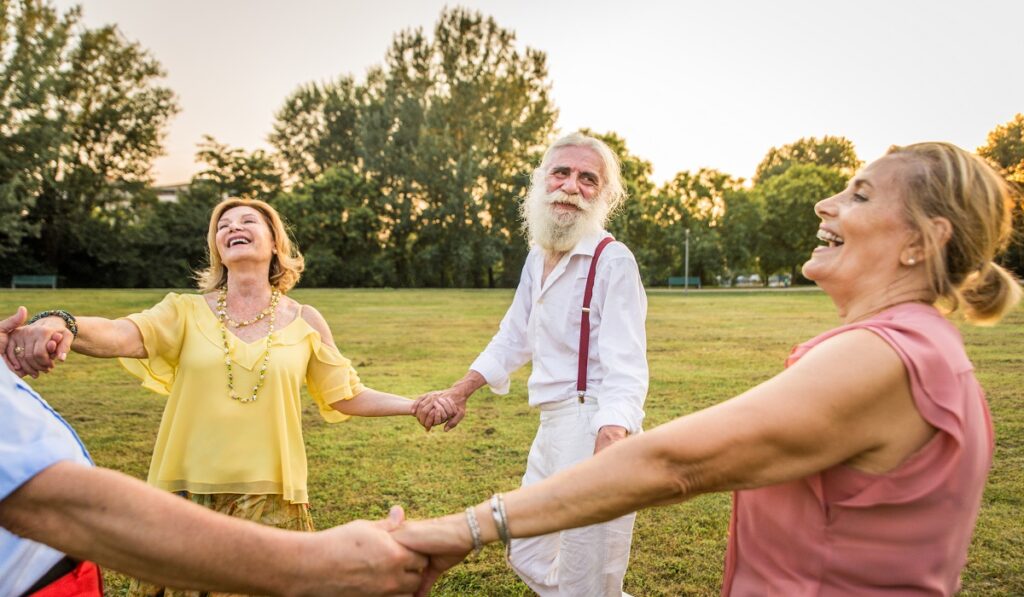As people age, their routines often shift indoors—less walking, fewer outings, and more time spent alone. But research and real-life experience consistently show the immense benefits of nature for physical, mental, and emotional health. For seniors, especially, spending time in nature can be transformative. Whether it’s a walk through a quiet garden, sitting in a sunny courtyard, or enjoying time by a tree-lined path, these simple interactions with the natural world offer measurable improvements to daily life.
Understanding why nature is important for the elderly means recognizing that nature is more than a backdrop—it’s a therapeutic, engaging environment that helps older adults stay physically, emotionally, and socially connected.
Whether it’s enjoying a garden, taking part in light outdoor activities, or simply sitting under a tree in the fresh air, nature and the outdoors offer critical health benefits that support aging with dignity and vitality.

Key Takeaways
- Spending time in nature improves mental clarity, reduces stress, and lowers symptoms of depression.
- Light outdoor activity supports mobility, strength, and cardiovascular health.
- Connecting seniors with nature fosters social interaction and reduces feelings of isolation.
- Integrating nature into daily routines can help seniors live longer, healthier, and more connected lives.
Boosting Mental Well-being and Cognitive Clarity
For many seniors, emotional and cognitive challenges increase with age. Feelings of anxiety, depression, or confusion can become more common—especially for those who experience isolation, loss, or cognitive decline. Fortunately, nature can be a powerful buffer against these challenges.
Here’s how spending time in nature benefits the mind:
- Reduces anxiety and depression
Natural environments prompt the body’s built-in relaxation response. The simple act of walking through a garden, sitting beneath a tree, or listening to birdsong can lower cortisol levels—the stress hormone—and stabilize mood. This calming effect is especially beneficial for seniors who may feel lonely or emotionally depleted. - Improves mood and daily outlook
Sunlight and greenery stimulate serotonin production, helping lift spirits and reduce feelings of sadness or emotional flatness. For those struggling with motivation or low energy, even a brief exposure to daylight and natural scenes can noticeably enhance mood and overall perspective. - Enhances cognitive function
Engaging with nature stimulates multiple senses at once—sight, sound, smell, and touch—which supports brain activity. Research has shown that spending time in nature may improve attention spans and memory recall, especially for older adults in the early stages of cognitive decline, such as dementia or Alzheimer’s.
In short, just a few minutes of outdoor time each day can become a simple, low-risk method of supporting both emotional wellness and mental clarity. The National Library of Medicine highlighted that exposure to natural environments is associated with improved cognitive function, brain activity, and mental health outcomes.
Enhancing Physical Health and Vitality
Nature doesn’t just soothe the mind—it energizes the body. For seniors, the benefits of nature extend to physical well-being, offering a natural way to stay active, improve mobility, and maintain overall vitality. Many outdoor environments promote gentle, sustainable movement that supports longevity and independence.
Key physical health benefits include:
- Better mobility, strength, and balance
Uneven garden paths, grassy areas, and natural inclines create opportunities for safe but effective physical movement. Activities like light gardening, short nature walks, or even standing and stretching outdoors help build core strength, improve posture, and enhance balance—all important for fall prevention. - Improved heart and immune health
Regular exposure to sunlight helps the body produce vitamin D, which is essential for strong bones and immune response. Outdoor exercise also improves blood circulation, lowers blood pressure, and strengthens the cardiovascular system. - More energy and less fatigue
Many seniors report feeling more alert and refreshed after spending time outside. Exposure to daylight helps regulate the sleep-wake cycle (circadian rhythm), which can lead to better quality sleep at night and more energy throughout the day.
Physical health is directly tied to independence. By integrating time in nature into daily routines, seniors can stay stronger, more active, and more resilient as they age.
Cultivating Social Connections and Reducing Isolation
Loneliness is one of the biggest threats to senior health, with serious consequences for mental and physical well-being. Fortunately, nature provides a natural and inviting space for interaction, bonding, and emotional connection.
Here’s how nature fosters social engagement:
- Encourages spontaneous interactions
Outdoor spaces naturally invite interaction. Whether it’s a brief chat with a neighbor on a garden bench or walking with a family member around the yard, being outside creates easy, low-pressure opportunities for connection. - Facilitates meaningful relationships
Participating in gardening projects, walking groups, or even birdwatching clubs allows seniors to enjoy hobbies while building new friendships. These shared interests offer a sense of purpose and belonging that’s crucial for emotional health. - Creates a calming setting for family and spiritual bonding
The calm of nature enhances family visits or spiritual reflection. Seniors often feel more open, relaxed, and connected when surrounded by nature—making it a perfect setting for heart-to-heart conversations or quiet companionship.
At Serenity Living Home Care, outdoor programs are thoughtfully designed to support not just physical health, but emotional connection—making sure seniors feel included, engaged, and part of something meaningful.
A Pathway to Purpose and Stress Reduction
One of the most transformative benefits of nature is its ability to provide a sense of purpose. As seniors experience major life changes—such as retirement, loss of a spouse, or health setbacks—it’s easy to feel unanchored. Nature helps restore balance and meaning.
Here’s how nature supports stress relief and purpose:
- Provides daily goals and structure
Simple outdoor tasks like watering plants, tending to a garden, or feeding birds can give seniors a sense of direction. These routines offer structure, foster responsibility, and help boost self-esteem. - Promotes mindfulness and relaxation
Natural environments gently draw the mind away from worries. The sound of leaves rustling, the sight of butterflies, or the feel of a breeze on the skin encourage mindfulness—a practice shown to reduce anxiety and support emotional resilience. - Relieves chronic stress
Spending time outdoors helps regulate the body’s stress response. Studies have shown that exposure to green spaces can reduce inflammation and lower cortisol—both linked to better overall health and reduced risk of chronic disease.
These sensory-rich experiences are not only enjoyable—they’re healing. And they’re simple to integrate into daily routines.
A study detailed in Scientific Reports, for example, demonstrated that a 24-session therapeutic horticulture initiative substantially lessened anxiety and enhanced cognitive function among older adults. Furthermore, participants consistently noted greater happiness after each session, indicating that hands-on plant activities contribute positively to both the mental and cognitive health of seniors.
Conclusion
The benefits of nature for older adults go far beyond the surface. From improved mental clarity and emotional peace to stronger bodies and deeper connections, spending time in nature is a powerful yet simple way to enhance quality of life. And most importantly, it’s never too late to start.
At Serenity Living, we understand why nature is important for the elderly. That’s why we intentionally create opportunities to connect seniors with nature—through peaceful garden spaces, fresh air, and meaningful moments outdoors. Nature isn’t just a backdrop; it’s part of how we help our residents feel truly at home.
If you’re exploring care options that honor the whole person—mind, body, and spirit—Serenity Living is here to help your loved one reconnect with the joys of nature and the outdoors every day. Contact us today!
Frequently Asked Questions about Benefits of Nature
What are the benefits of nature?
Nature helps reduce stress, anxiety, and depression while boosting mood, memory, and physical health—especially in older adults.
What makes nature so important?
Nature supports both mental and physical well-being by lowering stress, improving mood, and encouraging gentle activity and relaxation.
Why is nature important for the elderly?
For seniors, nature provides calm, movement, social interaction, and mental stimulation—all of which help maintain independence and well-being.
What is a good environment for the elderly?
A good environment includes safe, outdoor access to greenery and sunlight, promoting movement, comfort, and emotional connection.
How does the environment affect the elderly?
The right environment can reduce stress, enhance mood, and support cognitive and physical health, while a poor one can lead to isolation or decline.


